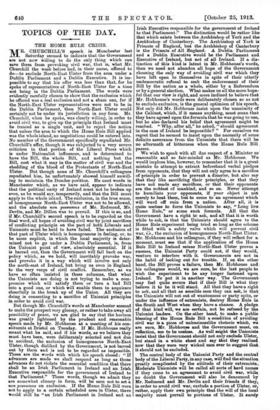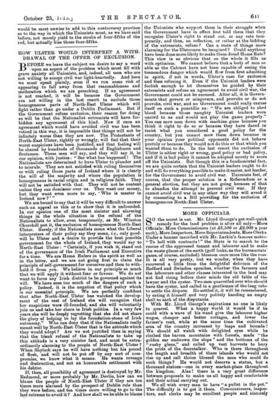TOPICS OF THE DAY.
THE HOME RULE CRISIS.
AIR. CHURCHILL'S speech in Manchester last Saturday seemed to indicate that the Government are not now willing to do the only thing which can save them from provoking civil war, that is, what Mr. Churchill the week before had, in their name, offered to do—to exclude North-East Ulster from the area under a Dublin Parliament and a Dublin Executive. It is im- possible to say that his offer was less than that, for he spoke of representatives of North-East Ulster for a time not being in the Dublin Parliament. The words were evidently carefully chosen to show that the exclusion which he offered was a real exclusion and not a sham one, for if the North-East Ulster representatives were not to be in the Dublin Parliament, then North-East Ulster could certainly not be under its jurisdiction in any form. Mr. Churchill, when he spoke, was clearly willing, in order to avoid civil war, to give up the principle that Ireland must be treated as a single unit, and to reject the notion that unless the area to which the Home Rule Bill applied was the whole island, no negotiations could be entered into. No member of the Government specifically repudiated Mr. Churchill's offer, though it was subjected to a very severe criticism in that portion of the Liberal Press which is under Nationalist influences, and is determined to have the Bill, the whole Bill, and nothing but the Bill, cost what it may in the matter of civil war and the shedding of the blood of the Protestants of North-East Ulster. But though none of Mr. Churchill's colleagues repudiated him, he unfortunately showed himself unwill- ing to maintain the Dundee position. He used words in Manchester which, as we have said, appear to indicate that the political unity of Ireland must not be broken up even, as he would say, temporarily, and that the Bill must apply to the whole island. The exclusion, in the true sense, of homogeneous North-East Ulster was not to be allowed, and the absolute non possums of Mr. Redmond, Mr. Devlin, and Mr. Dillon was to prevail. If this is so, and if Mr. Churchill's second speech is to be regarded as the final word, all hopes of avoiding civil war by joint sacrifices of conflicting principle on the part of both Liberals and Unionists must be held to have failed. The exclusion of that part of Ulster which is homogeneous in feeling, or, to be more explicit, in which the local majority is deter- mined not to go under a Dublin Parliament, is, from the Unionist point of view, absolutely essential. If it is barred out, then the Government will fall back on the policy which,. as we hold, will inevitably provoke war, and provoke it in a way which will involve not only the north-east of Ireland, but bring us even in England to the very verge of civil conflict. Remember, as we have so often insisted in these columns, that what the Unionists are doing is not trying to make a com- promise which will satisfy them or turn a bad Bill into a good one, or which will enable them to acquiesce cheerfully in the break up of the Union. All they are doing is consenting to a sacrifice of Unionist principles in order to avoid civil war.
But though Mr. Churchill's words at Manchester seemed to make the prospect very gloomy, or rather to take away all possibility of peace, we are glad to say that the horizon was greatly lightened by the prudent and reasonable speech made by Mr. Hobhouse at a meeting of his con- stituents at Bristol on Tuesday. If Mr. Hobhouse really meant what he said, and if his words, as we believe they must have been, were deliberately selected and not due to accident, the exclusion of homogeneous North-East Ulster, though disliked by the Government., is not barred out by them and is not to be regarded as impossible. These are the words with which his speech closed: "If advances are made we shall respond as long as those advances do not violate the essential condition that there shall be an Irish Parliament in Ireland and an Irish Executive responsible for the government of Ireland to that Parliament." These words, though we admit they are somewhat clumsy in form, will be seen not to set a non possunvus on exclusion. If the Home Rule Bill were not to apply to a certain scheduled area in Ulster, there would still be " an Irish Parliament in Ireland and an Irish Executive responsible for the government of Ireland to that Parliament." The distinction would be rather like that which exists between the Archbishop of York and the Archbishop of Canterbury. The Archbishop of York is Primate of England, but the Archbishop of Canterbury is the Primate of All England. A Dublin Parliament and a Dublin Executive would be the Parliament and Executive of Ireland, but not of all Ireland. If a dis- tinction of this kind is latent in Mr. Hobhouse's words, then we need not abandon all hope of the Government choosing the only way of avoiding civil war which they have left open to themselves in spite of their utterly undemocratic refusal to seek the endorsement of their Bill by the nation as a -whole, either by a Referendum or by a general election. What makes us all the more hope- ful that our view is right, and more inclined to believe that Mr. Hobhouse's words were deliberately chosen so as not to exclude exclusion, is the general optimism of his speech. Not only did Mr. Hobhouse insist upon the unanimity of the Cabinet, which, if it means anything, must mean that they have agreed upon the formula that be was going to use, but he also declared his belief that agreement might be reached. " Why, after all," he asked, " should agreement in the case of Ireland be impossible ? " For ourselves we regret that he seemed to insist upon the necessity of some definite assurance from the Unionists that there will be no aftermath of bitterness when the Home Rule Bill passes.
We wish to speak with all due respect of a Minister so reasonable and so fair-minded as Mr. Hobhouse. We would implore him, however, to remember that it is a great mistake to attempt to extract beforehand verbal pledges from opponents, that they will not only agree to a sacrifice of principle in order to prevent a disaster, but also say that they like sacrificing their principles, or that they have not made any sacrifices, or that their opponents are the noblest of mankind, and so on. Never attempt to humiliate your opponents, if your object is not merely to beat them, but to come to an agreement which will ward off ruin from a nation. After all, it is quite useless to force the Unionists to say, " Long live Home Rule," or some such formula. All that the Government have a right to ask, and all that it is worth while to ask, is that the Unionists should agree to the Home Rule experiment being tried so long as the scheme is fitted with a safety valve which will prevent civil war, i.e., the exclusion of homogeneous North-East Ulster. Mr. Hobhouse and his colleagues, if they will reflect for a moment, must see that if the application of the Home Rule Bill to Ireland minus North-East Ulster proves a success, the Unionist Party could not, if they would, venture to interfere with it. Governments are not in the habit of looking out for trouble. If, on the other hand, the Bill proves a failure, then Mr. Hobhouse and his colleagues would, we are sure, be the last people to wish the experiment to be any longer fastened upon Ireland. To put it in another way. The Government may feel quite secure that if their Bill is what they believe it to be it will stand. All that they have a right to ask, and all that as sensible men they can ask, is that the Unionists will not out of wantonness or party spite, or under the influence of extremists, destroy Home Rule in the South and West when they have a chance. A pledge of that kind will, we are certain, not be refused by the Unionist leaders. On the other hand, to make a public blessing of the Home Rule Bill a condition of avoiding civil war is a piece of unbusinesslike rhetoric which, we are sure, Mr. Hobhouse and the Government must, on reflection, see to be useless. As well might the Unionists insist that the Government should not only exclude Ulster, but stand in a white sheet and say that they realized now that they were very wicked men ever to suggest that, it should not be excluded.
The central body of the Unionist Party and the central body of the Liberal Party, in any case, will find the situation greatly complicated by the attitude of their extremists.. Moderate Unionists will be called all sorts of hard names if they come to an agreement to avoid civil war, while no doubt the Government will also be denounced by Mr. Redmond and Mr. Devlin and their friends if they, in order to avoid civil war, exclude a portion of Ulster, or, rather, apply their own principle that the will of the local majority must prevail to portions of Ulster. It surely
would be most unwise to add to this controversy provisos as to the way in which the Unionists must, as we have said before, not merely yield to the stroke of four-fifths of the rod, but actually kiss those four-fifths.















































 Previous page
Previous page